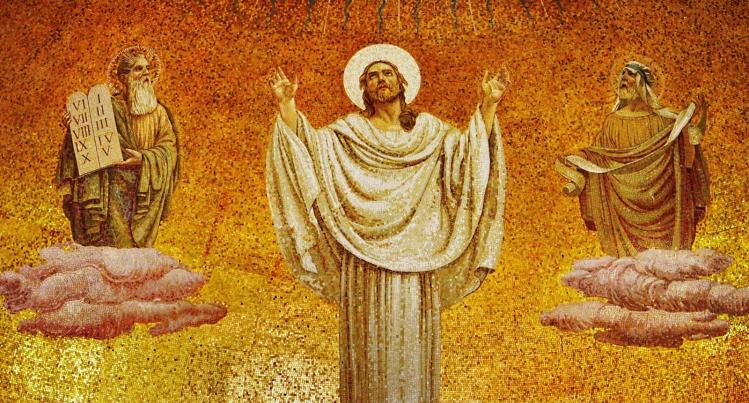
Like many people, I’ve gotten into the habit of thinking of life prior to the pandemic as the before time. As the distribution of COVID-19 vaccines accelerates, one can’t help but feel impatient about getting to the after time. In the meantime, I jokingly ask my husband if he remembers how we used to plan trips, go to the movies, and eat out in the before time. This helps us shake off the daily pandemic routine. We remember that it hasn’t always been like this, and we hope for a time when it will all be a memory.
It was exactly the second Sunday of Lent in 2020, a liturgical year ago, when I last celebrated Mass with my community. As on every second Sunday of Lent, we heard a Gospel account of the Transfiguration of Jesus. It was also the last time I had dinner and drinks with friends in a crowded restaurant. I was into my fifth year of serving as the director of evangelization and adult formation at the cathedral in downtown Los Angeles, and as is tradition, we were celebrating the RCIA’s rite of calling to continuing conversion. This rite affirms the spiritual journey of candidates, commits them to a lifetime of conversion, and recognizes the candidates, who have already been baptized, to complete their initiation in the Easter season. This meant a full day of ministry, Masses in the morning with RCIA dismissal, and an archdiocesan-wide liturgy in the late afternoon, where parish groups from across the archdiocese gathered in one place. The cathedral has a capacity of approximately three thousand people. In hindsight, it’s unsettling to think I was around so many people that day; just a few days after that, Masses closed to the public because of COVID-19.
A very close friend of ours was among those celebrating the rite, so we gathered afterward at a local Mexican restaurant. It’s one of those places where you can count on great margaritas and fajitas that come to the table sizzling; there’s live music, too, and the sound of lively conversations and laughter reverberates throughout the room. I remember this day fondly.
In the Gospel of Mark, after Jesus is transfigured, and after Elijah and Moses appear and converse with Jesus, we hear this: “Peter said to Jesus in reply, ‘Rabbi, it is good that we are here! Let us make three tents: one for you, one for Moses, and one for Elijah”’ (Mark 9:5). Mark goes on to explain that Peter was so terrified that he hardly knew what to say, as a way to excuse Peter’s seemingly ridiculous suggestion. I don’t think Peter was being ridiculous at all. Perhaps Peter offered to serve Jesus, Moses, and Elijah by pitching tents because he, in that moment, had full knowledge of the divinity of Jesus and found himself desiring for the moment to never end. Jesus and the prophets were conversing, after all. Why not get comfortable? When the “cloud came, casting a shadow over them” and “from the cloud came a voice, ‘This is my beloved Son, listen to him”’ (Mark 9:7), the message came to Peter not as news, but as an affirmation of what he already knew through his experience. This was a powerful moment of grace for Peter. I imagine that it would be a memory that would serve him well during the darkest moments of the Passion of Christ.
When I recall my most profound moments of grace, I yearn to return to that moment so that I may once again feel myself enveloped in the love and presence of the Divine. The memory reminds me that the present moment is fleeting, especially if the present moment is painful. But the memory of grace isn’t limited to a return to the past. Grace is also a taste of salvation, and so, when I remember moments of grace, I am shown the Kingdom of God and my hope is restored. Savoring the memory of grace takes me back to grace.
It would appear that the rite of calling to continuing conversion for those candidates celebrated a liturgical year ago would serve as a calling for me as well. I had no idea of what the coming year had in store for us. At this moment, after half-a-million deaths due to COVID-19, and while children separated from their families at the Mexican border continue to suffer, and as we recall the deadly events that led to last summer’s protests against racial injustice, we are all in need of remembering our Transfiguration moments. Moments in which the image of Jesus came to life for us, where his humanity and his divinity became real to us. Moments, big and small, where we savored God’s love, mercy, and communion. The Transfiguration is the gift of a memory to get us through the present moment and to work for the Kingdom of God revealed by it.
